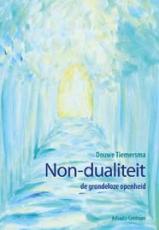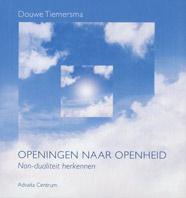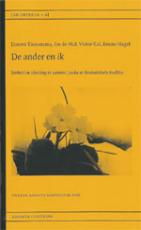Advaita Post Volume 15 - #03 - Not going along with things
Text Satsang
From an advaita talk with Douwe Tiemersma. Schiermonnikoog, June 14, 2002
(Not) Going along with things
Douwe, what you can clearly see in this (inner) space are all those games that the person plays.
When you see everything from that perspective you're no longer positioned one hundred percent in those games. Then everything becomes quite relative.
How the hell is it possible that I've done that for so many years?
If you can say it that way then you're no longer in it. It's important to recognize that. Things have a tendency to just perpetuate themselves, but you look at it from a distance. Then the power goes out of it. You keep looking at it as though it were a play and you become aware of the great, infinite space. That is your space. When there's an infinity like that, what's this world now? Nothing.
I've participated in it for years and still see its conditionings, the residue. I see it around me in others, too, everywhere, it's almost like a spiderweb.
The one is strengthened by the other and vice versa. It goes on like that. Once you have seen the other side of it then you say: it's no longer necessary.
It takes up so much energy.
An incredible amount of energy, so much tension, so much effort, so much suffering. Just imagine what would happen if onetime all that could be released.
The insight will have to continue on to a great depth, because the conditionings are so deep, physically very deep, instinctively, at depths which initially you weren't even aware of. When you exercise calm and maintain a persistently clear view, at a certain moment you catch sight of these heavy blockages. Then they slowly emerge and you can see them. There is still some force in them - they are these old conditionings - but precisely because you can see them from a distance the force gradually diminishes. Then you notice that the heaviness of the sphere is suddenly a little bit less. What does that mean? That you no longer hold on to things in the old way. So, more and more pieces can fall away, though initially they may continue to bubble up for a while.
If you keep interfering with it, if you actually go along with the old force of habit, if you look at anything with longing, you dive back in. This means that you have put a huge amount of your own energy into it. Because you have invested so much energy into it and nourished it, through that it just gets stronger. Through that it becomes real. When go along with it you sacrifice yourself to such an image. And that is idolatry. That means that you have become a complete slave, totally determined by it.
If you don't do that, the image isn't nourished, there's no more energy and so it becomes an empty shell and just falls off. That is possible when you have a difference in levels in a vertical sense, when there is space. Then you see how it works and conclude that getting into that is simply too crazy for words. Because that's suffering, because you're no longer yourself, because you're limited, because you've made yourself completely dependent on what you have created. Your deeper desires have nothing to do with that and so you're frustrated.
So, you should just see things as impressions, images in yourself, which you have created.
Flies see other things than people do. Everyone has blinders on. When impressions come, where do they appear? In space. You make all kinds of great images of flies who flutter around with blinders on, but you're so imprisoned by images. The point is that you are essentially free, free from images as well as free in insight. But now you need to become free from images.
Anyone else?
Images can engulf you; the phenomena can be so huge that they dominate everything.
So you completely surrender yourself to phenomena. First you make this reality so great, so important in relation to yourself, that this reality returns and swallows you.
That's my experience.
It's good to look more precisely at what's happening. There is a merging with phenomena. You get that when you just fly into it. You're focused on something, you dive all the way into it, you become a part of that reality, and live within it. Then you are subject to that reality, you are melted together with it, completely identified with it. From a distance you make the phenomena so large that they return and completely engulf you. So, you're going to come together with it.
Initially you have made this external reality so real and so big, put ??so much effort into it, that you give it the capacity to swallow you.
Can't you retain your distance?
Then something else must take place, a recognition. You notice that they are all phenomena which arise and disappear once again, all these processes of engulfing and swallowing. But, there is something remaining there which is not subject to anything. And you are that.
Why do people dive into other things, so they merge with it, are absorbed into it? Why do they make these things so important that they return and completely engulf the person? And this is perceived as positive. Why? Because a greater realm arises in which the person, who is limited, is absorbed. Suppose you're really excited about the hospital environment where you work - you dive all the way in, you do everything so that your professional work will go well there - that can provide a real kick. Why? Because you're no longer thinking of yourself as a person but are absorbed into a greater whole. Especially when you work in a good team, and when all goes well, there is a more expansive realm than the realm of the closed off and limited "I". You also experience that with being swallowed, when something really big comes along. Being swallowed up in the great whole has something wonderful to it. Because you enter into a greater sphere. Personal tensions are hardly there, because you experience everything within the greater whole.
But when you look a little further into it, you see that the greater whole also has limits. Then you see that you have surrendered to that 'other' which is also limited. You live according to that larger whole with all the conditions and limits which it entails. You might then ask yourself: what about myself? I'm not positioned there one hundred percent. Thus, the identification with that greater whole isn't totally complete. Why not? Because the self-being is always greater than all these phenomena. It's good to see that that fascination is based on larger entities such as your work, your country, all the -isms, including realism and spiritualism. But go back to your insight: my self-being is more expansive than that.
****
Er is geen tweeheid
als je ontspannen bent
in zelf-bewustzijn
is dat duidelijk.
Boeken
Douwe schreef en redigeerde gedurende zijn leven boeken. Via onze uitgeverij zijn deze nog verkrijgbaar.



